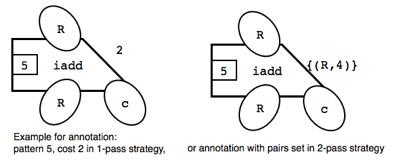Compilation Methods SS 2013 - Assignment 5
Kastens, Pfahler, 13. Juni 2013
Exercise 1 (Storage Mapping for Arrays)
The following declaration appears in a Pascal program:
var rain: array [1..12, 2000..2029] of integer;
- a)
- Draw the memory layout in row-major order.
- b)
- Let's assume a target architecture that uses 32 bit
integers (4 bytes) and requires integers to be aligned on
4 byte boundaries.
What is the index map (see Slide 305) for the declared array? Use a Horner scheme with all constant parts of the array descriptor determined at compile time.
- c)
- Give intermediate code
in the style of Slide 316 for the following statement:
rain[month, 2011] := 13;
Compiled code for our target architecture uses register R6 to store the base address of the current activation record on the run-time stack. Assume that variable month is stored at offset 8 and that the array starts at offset 12. The assignment is represented as a node of type assign. Its left subtree must compute the address of the target location; its right subtree must represent the value to be assigned. Assume compile time evaluation of all operations on constant operands.
Exercise 2 (Code Sequences for Control Statements)
Design code sequences for for-loops and do-while-loops in C. Example sequences for different kinds of loops appear on Slide 315.
Exercise 3 (Code Selection by Pattern Matching in Trees)
- a)
- The following set of translation patterns describes a simple RISC
processor:
No. Operator Operands Result Code Costs 1 iconst const -> IConst ./. 0 2 iconst const -> IReg move #const, IReg 1 3 var address -> IReg addr #adress, IReg 2 4 iadd IReg1, IReg2 -> IReg3 add IReg1, IReg2, IReg3 2 5 iadd IReg1, IConst -> IReg2 add IReg1, #const, IReg2 2 6 deref IReg1 -> IReg2 load IReg1, IReg2 3 7 assign IReg1, IReg2 -> Stmt store IReg1, IReg2 2 Assume that the following source code
{ int v[8]; struct { int x, y; } p; p.y = v[7] + 9; }has been translated to the intermediate code tree given below. Use the set of patterns to cover that tree. Apply two different strategies:- Choose locally optimal solutions to cover the tree in a single bottom-up traversal through the tree.
- Apply the 2-pass-strategy that makes its decisions based on costs of whole subtrees (Slide 320).

Fill in the annotations for the 1-pass strategy:
Fill in the annotations for the 2-pass strategy:
Is there a difference in the tree covers? - b)
- Consider 3 additional tree patterns:
The new instructions compute a to be accessed memory address as the sum of the contents of two registers.No. Operator Operands Result Code Costs 8 iadd IReg1, IReg2 -> RegSum ./. 0 9 deref RegSum -> IReg3 load IReg1+ IReg2, IReg3 3 10 assign RegSum, IReg3 -> Stmt store IReg1+ IReg2, IReg3 2
Apply both tree cover strategies again. Fill in the annotations for the 1-pass strategy:
Fill in the annotations for the 2-pass strategy:
Is there a difference in the tree covers? - c)
- LAB/HOME:
The directory
blatt5/risccontains the above set of translation patterns in a form that is suitable for the bottom-up rewriting generator BURG. The filerisc.burgcontains a specification of the tree patterns and a test program that computes a cost optimal cover of a given intermediate code tree.To compute a cost optimal cover of the example tree, use BURG to build a tree automaton:
./burg -I risc.burg > risc.c
Afterwards compile and link the resulting C source code. (The fileutil.csupports tree construction, it is included and linked.)cc -o risc risc.c
Start the resulting program risc and compare its output with your solution of part (a).Note: The supplied burg executable works on Linux computers only.
- d)
- LAB/HOME:
Extend the pattern specification in file
risc.burgwith the additional "RegSum" tree patterns described above. These patterns represent the machine instructionsload IReg1+IReg2,IReg3
and
store IReg1+IReg2,IReg3
respectively.
Regenerate the tree automaton from the modified specification. What cost optimal tree cover does the new automaton find?
Generiert mit Camelot | Probleme mit Camelot? | Geändert am: 13.06.2017


